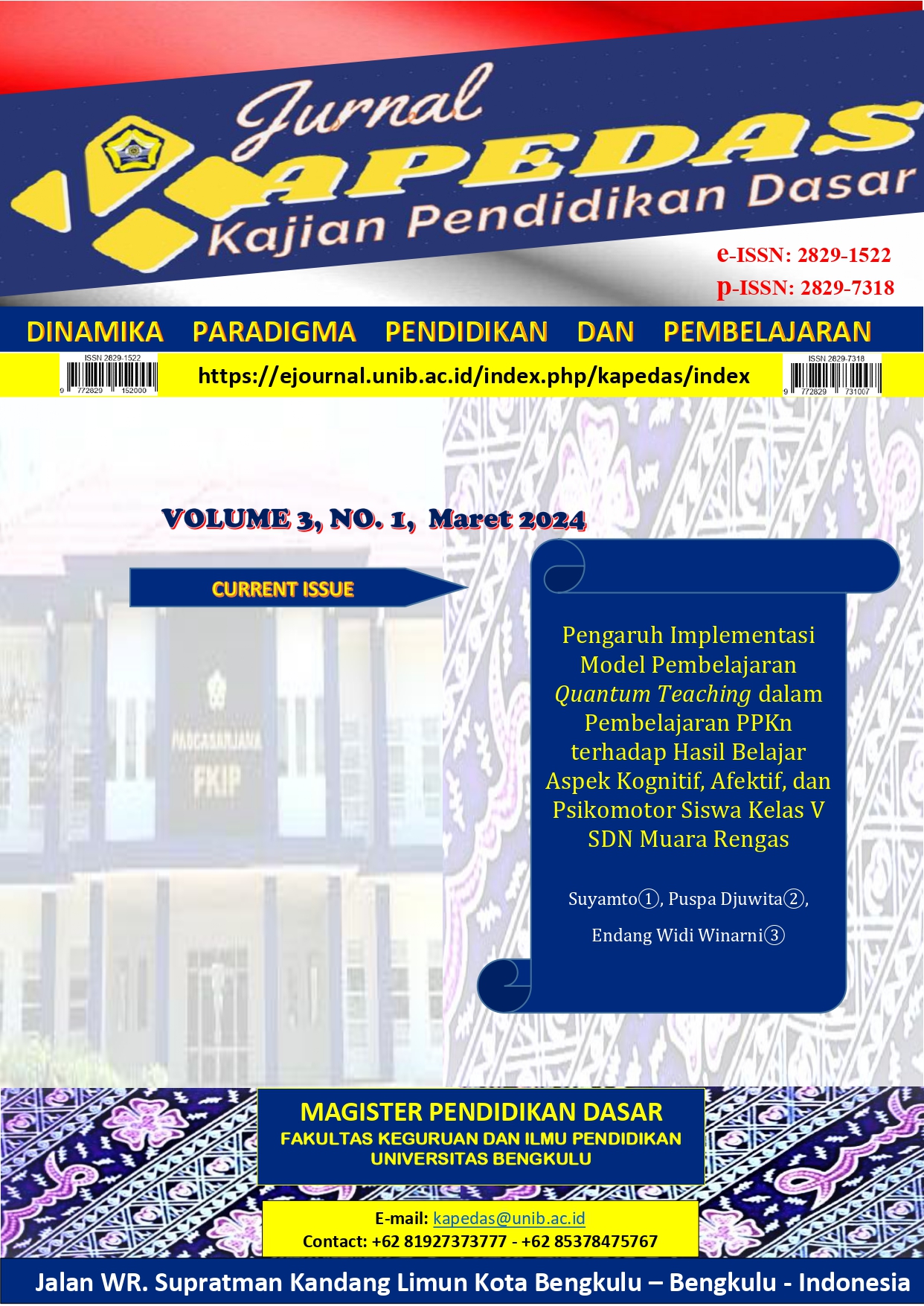Main Article Content
Abstract
This research aims to produce an E-worksheet product based on the Project Based Learning (PJBL) model using traditional Bengkulu food to improve the ability to solve mathematical problems in class rounding material. IV elementary school. This research is a Research and Development study (R&D with the ADDIE model. The subjects in this research were students of SDN 52 Bengkulu City, totaling 26 students in class IV B as the control class, and 26 students in class IV C as the experimental class. The instruments used in this research is an interview guide, questionnaire, and problem solving test in the form of essay questions via pretest and posttest. The data analysis technique in this research is validation analysis using Aiken's V and Interrater Reliability, teacher and student responses, as well as quantitative analysis using the t test. From the research results It is known that the results of material, language and design validation, as well as teacher and student responses to E-worksheets are very feasible and good for use in learning so that students are happy and interested in learning. The results of the effectiveness of E-worksheets are effective in influencing students' mathematical problems. Judging from the results of the scores The significance is 0.00, which is smaller than α = 0.05. Based on the gain-score test from using the E-worksheet, it gives a moderate gain score of 53%. So the mathematical problem solving abilities of students who use PjBL-based E-worksheets with typical Bengkulu food ingredients are higher than students who only use textbook worksheets from school so they are declared effective.
Article Details
Copyright (c) 2024 Novia Kurnia Sari, Agus Susanta, Endang Widi Winarni

This work is licensed under a Creative Commons Attribution-ShareAlike 4.0 International License.

Karya ini dilisensikan di bawah Creative Commons Attribution-ShareAlike 4.0 International License .
References
-
Almulla, M. A. (2020). The Effectiveness Of The Project-Based Learning (PBL) Approach As A Way To Engage Students In Learning. Sage Open, 10(3).
Casinillo, L. F., Galenzoga, R. S., Raagas, D. L. (2020). EVALUATING MATHEMATICS LEARNING EXPERIENCE OF GRADE 7 STUDENTS OF BATO SCHOOL OF FISHERIES. International Journal of Indonesian Education and Teaching. 4(2). 193-207.
Divayana, D. G. H., Suyasa, P. W. A., dan Adiarta, A. (2018). Pelatihan Pembuatan Buku Digital Berbasis Kvisoft Flipbook Maker Bagi para Guru di SMK TI Udayana. Abdimas Dewantara. 1(2). 31-44.
Hewi, L., & Shaleh, M. (2020). Refleksi Hasil PISA ( The Programme For International Student Assesment): Upaya Perbaikan Bertumpu Pada Pendidikan Anak Usia Dini ). Jurnal Golden Age, 04(1), 30–41.
Intan, S., Rita,D., & Niniwati, N. (2020). Pengembangan Lembar Kerja Peserta Didik Berbasis Pendekatan Saintifik pada Pembelajaran Matematika Kelas VIII. Jurnal Fakultas Keguruan dan Ilmu Pendidikan. 1(2).
Le, V., Benabou, L., Tao, Q., & Etgens, V. (2017). Modeling of intergranular thermal fatigue cracking of a lead-free solder joint in a power electronic module. International Journal of Solids and Structures, 107, 1–12. https://doi.org/10.1016/j.ijsolstr.2016.12.003
Sugiyono. (2013). Metode Penelitian Kuantitatif, Kualitatif dan R&D. Bandung: Alfabeta.
Susanta, A., dan Koto, I. (2020). The Development of Mathematics Teaching Material Based on Problem Solving to Support the Goal Achievement of Primary Education Mathematics Courses. Atlantis Press. Vol 532. 21-25.
Syahril, R. F., Saragih, S., dan Heleni S. (2020). Pengembangan Perangkat Pembelajaran Matematika Menggunakan Model Problem Based Learning Pada Materi Barisan dan Deret untuk Kelas XI SMA/MA. Jurnal Prinsip Pendidikan Matematika. 3(1). 9-17.
Ulya, H., dan Rahayu, R. (2017). Pembelajaran Etnomatematika Untuk Menurunkan Kecemasan Matematika. Jurnal Mercumatika : Jurnal Penelitian Matematika dan Pendidikan Matematika. 2(1). 16-23.
Winarni, E.W. (2018) Teori Dan Praktik Penelitian Kuantitatif, Kualitatif, PTK, R&D. Jakarta: Bumi Aksara.
References
Casinillo, L. F., Galenzoga, R. S., Raagas, D. L. (2020). EVALUATING MATHEMATICS LEARNING EXPERIENCE OF GRADE 7 STUDENTS OF BATO SCHOOL OF FISHERIES. International Journal of Indonesian Education and Teaching. 4(2). 193-207.
Divayana, D. G. H., Suyasa, P. W. A., dan Adiarta, A. (2018). Pelatihan Pembuatan Buku Digital Berbasis Kvisoft Flipbook Maker Bagi para Guru di SMK TI Udayana. Abdimas Dewantara. 1(2). 31-44.
Hewi, L., & Shaleh, M. (2020). Refleksi Hasil PISA ( The Programme For International Student Assesment): Upaya Perbaikan Bertumpu Pada Pendidikan Anak Usia Dini ). Jurnal Golden Age, 04(1), 30–41.
Intan, S., Rita,D., & Niniwati, N. (2020). Pengembangan Lembar Kerja Peserta Didik Berbasis Pendekatan Saintifik pada Pembelajaran Matematika Kelas VIII. Jurnal Fakultas Keguruan dan Ilmu Pendidikan. 1(2).
Le, V., Benabou, L., Tao, Q., & Etgens, V. (2017). Modeling of intergranular thermal fatigue cracking of a lead-free solder joint in a power electronic module. International Journal of Solids and Structures, 107, 1–12. https://doi.org/10.1016/j.ijsolstr.2016.12.003
Sugiyono. (2013). Metode Penelitian Kuantitatif, Kualitatif dan R&D. Bandung: Alfabeta.
Susanta, A., dan Koto, I. (2020). The Development of Mathematics Teaching Material Based on Problem Solving to Support the Goal Achievement of Primary Education Mathematics Courses. Atlantis Press. Vol 532. 21-25.
Syahril, R. F., Saragih, S., dan Heleni S. (2020). Pengembangan Perangkat Pembelajaran Matematika Menggunakan Model Problem Based Learning Pada Materi Barisan dan Deret untuk Kelas XI SMA/MA. Jurnal Prinsip Pendidikan Matematika. 3(1). 9-17.
Ulya, H., dan Rahayu, R. (2017). Pembelajaran Etnomatematika Untuk Menurunkan Kecemasan Matematika. Jurnal Mercumatika : Jurnal Penelitian Matematika dan Pendidikan Matematika. 2(1). 16-23.
Winarni, E.W. (2018) Teori Dan Praktik Penelitian Kuantitatif, Kualitatif, PTK, R&D. Jakarta: Bumi Aksara.
